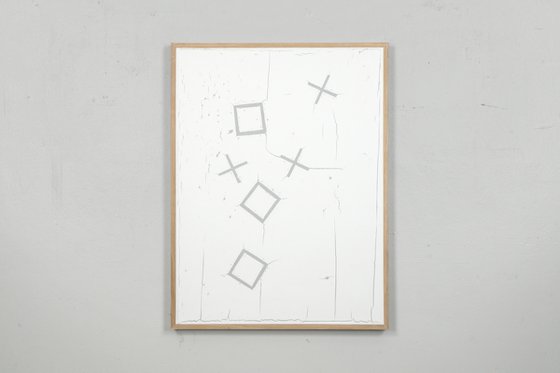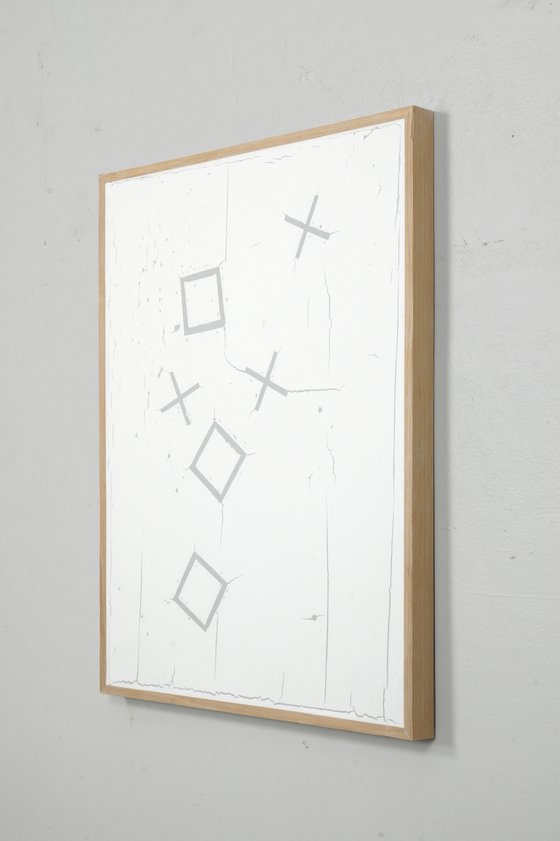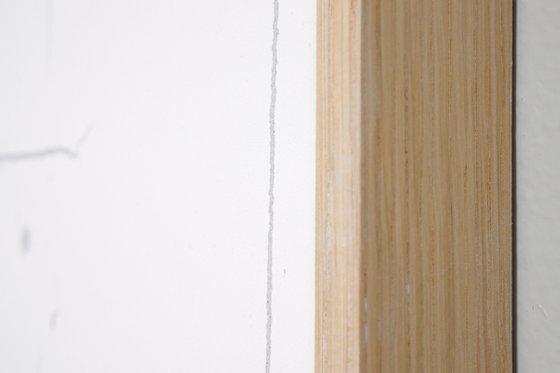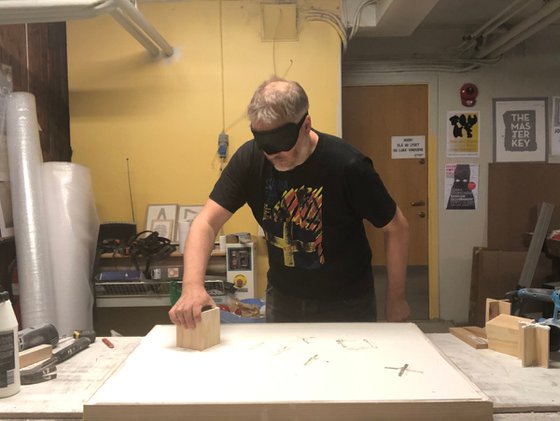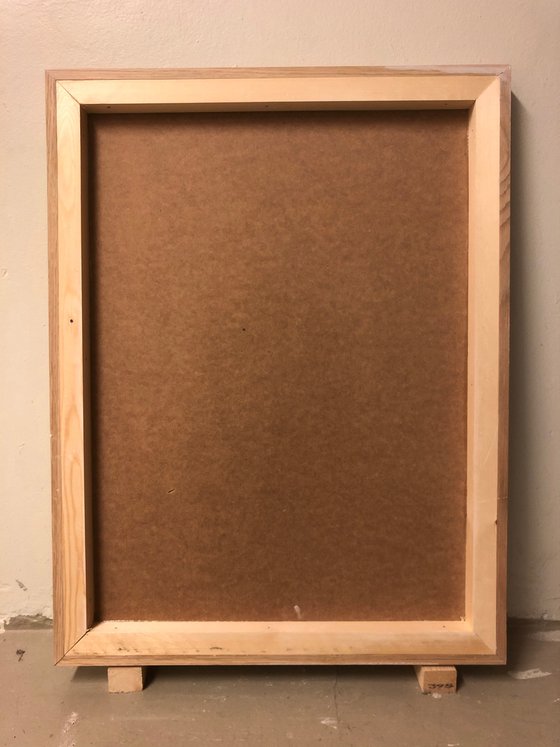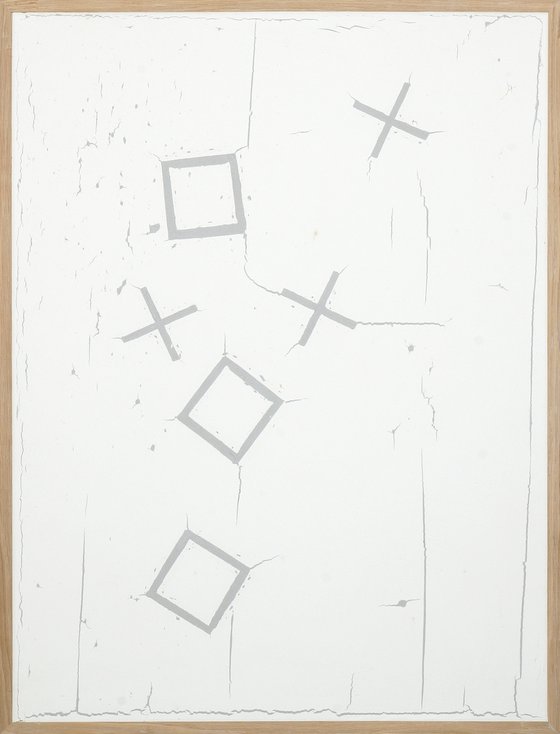- By medium
- By subject
- By budget
- Sales
- Gift cards
- Discover all art
- Artists
- Editors’ picks
- Ideas
Original artwork description:
64x84 cm | Filler, oak frame
The squares and x's are placed on the surface while blindfolded.
Throughout life, we continuously encounter different ways to evaluate our achievements. We have come to reckon it as a naturalized part of life. Being able to appreciate this is taken as a good trait. But it must be allowed to question whether most arguments for individual performance appraisals fit like a glove into the neoliberal capitalist logic. The assessments' overall purpose is to improve the individual's performance because it is financially profitable, not necessarily because it benefits the individual. It is natural to aspire to be good at what you do, to appreciate the recognition, respect and maybe even admiration that follows. But is it exclusively a good thing to separate what one does from what one is, in the way that is necessary to be able to relate neutrally or "professionally" to criticism? To learn looking at oneself from the outside by looking at the result of one's actions exclusively as perceived by others. Of course, we need this ability to develop empathy, but do we have the same need to assess our own utility function from a production perspective? Does it benefit us personally to have knowledge of the quality and efficiency of our work? Or is it primarily for the benefit of those who profit from it? Our need for sociality and our ability to understand others' points of view may be exploited to adapt our mental structure to a system based on measurability.
An assessment that can be categorized and compared reinforces the alienation that is already a fundamental part of the subject's constitution. The self-conscious self is to a great extent barred both from its underlying, bodily and psychological functions and from the surrounding reality. What the subject desires is to be part of a context outside the closed bubble of consciousness. Each individual develops different strategies to deal with this, but the strictly abstract-semantic self-understanding, which the measurability and performance culture of our time promote, can counteract this work. What we need is an intuitive self-understanding. The path to a more profound understanding of ourselves, and our relationship with the external, don't go through the purely linguistic but through language in use. Language transcribed into the physical concrete always brings something of the unexpected and uncontrollable that is necessary to leave the generic and reach into the particular and unique that signifies a genuine encounter.
Tick Boxes
This is a series of works that use squares and crosses as compositional elements. The very components that constitute so-called checkboxes on questionnaires with prepared answer options. It is a tool for different types of surveys and application forms—systems for sorting people into different categories and maintaining various boundaries and constraints.
They are an essential part of an expanding neoliberal organisational culture where measurable results are crucial. Efforts are analysed against predetermined standards to increase economic efficiency. Language is trimmed for aesthetic qualities in favour of a strictly rational understanding. These works want to illuminate and challenge this trend by deconstructing one of its primary forms.
In the sense of psychoanalytic theory, the reduction of subjective content to simple categories, that tick-boxing implicates, is a shortcut in the process of symbolisation, i.e. to pull a statement from the Imaginary without transposing it properly through the Real, giving it a unique and individual materialisation. Even as language is instrumental to primordial alienation, it can also remedy this, but only if the symbolisation process is thorough and recognised.
Materials used:
Filler (coarse and fine) in oak frame
Tags:
#abstract #painting #minimalism #filler #oak frame#304 Performance Appraisal (Blindfolded Version) (2020) Painting
by Johan Söderström
1 Artist Reviews
£1,030.3
- Painting on Panel / Board / MDF
- One of a kind artwork
- Size: 64 x 84 x 5cm (framed)
- Framed and ready to hang
- Signed on the back
- Style: Geometric
- Subject: Abstract and non-figurative
Loading
Original artwork description
64x84 cm | Filler, oak frame
The squares and x's are placed on the surface while blindfolded.
Throughout life, we continuously encounter different ways to evaluate our achievements. We have come to reckon it as a naturalized part of life. Being able to appreciate this is taken as a good trait. But it must be allowed to question whether most arguments for individual performance appraisals fit like a glove into the neoliberal capitalist logic. The assessments' overall purpose is to improve the individual's performance because it is financially profitable, not necessarily because it benefits the individual. It is natural to aspire to be good at what you do, to appreciate the recognition, respect and maybe even admiration that follows. But is it exclusively a good thing to separate what one does from what one is, in the way that is necessary to be able to relate neutrally or "professionally" to criticism? To learn looking at oneself from the outside by looking at the result of one's actions exclusively as perceived by others. Of course, we need this ability to develop empathy, but do we have the same need to assess our own utility function from a production perspective? Does it benefit us personally to have knowledge of the quality and efficiency of our work? Or is it primarily for the benefit of those who profit from it? Our need for sociality and our ability to understand others' points of view may be exploited to adapt our mental structure to a system based on measurability.
An assessment that can be categorized and compared reinforces the alienation that is already a fundamental part of the subject's constitution. The self-conscious self is to a great extent barred both from its underlying, bodily and psychological functions and from the surrounding reality. What the subject desires is to be part of a context outside the closed bubble of consciousness. Each individual develops different strategies to deal with this, but the strictly abstract-semantic self-understanding, which the measurability and performance culture of our time promote, can counteract this work. What we need is an intuitive self-understanding. The path to a more profound understanding of ourselves, and our relationship with the external, don't go through the purely linguistic but through language in use. Language transcribed into the physical concrete always brings something of the unexpected and uncontrollable that is necessary to leave the generic and reach into the particular and unique that signifies a genuine encounter.
Tick Boxes
This is a series of works that use squares and crosses as compositional elements. The very components that constitute so-called checkboxes on questionnaires with prepared answer options. It is a tool for different types of surveys and application forms—systems for sorting people into different categories and maintaining various boundaries and constraints.
They are an essential part of an expanding neoliberal organisational culture where measurable results are crucial. Efforts are analysed against predetermined standards to increase economic efficiency. Language is trimmed for aesthetic qualities in favour of a strictly rational understanding. These works want to illuminate and challenge this trend by deconstructing one of its primary forms.
In the sense of psychoanalytic theory, the reduction of subjective content to simple categories, that tick-boxing implicates, is a shortcut in the process of symbolisation, i.e. to pull a statement from the Imaginary without transposing it properly through the Real, giving it a unique and individual materialisation. Even as language is instrumental to primordial alienation, it can also remedy this, but only if the symbolisation process is thorough and recognised.
Materials used:
Filler (coarse and fine) in oak frame
Tags:
#abstract #painting #minimalism #filler #oak frame14 day money back guaranteeLearn more
